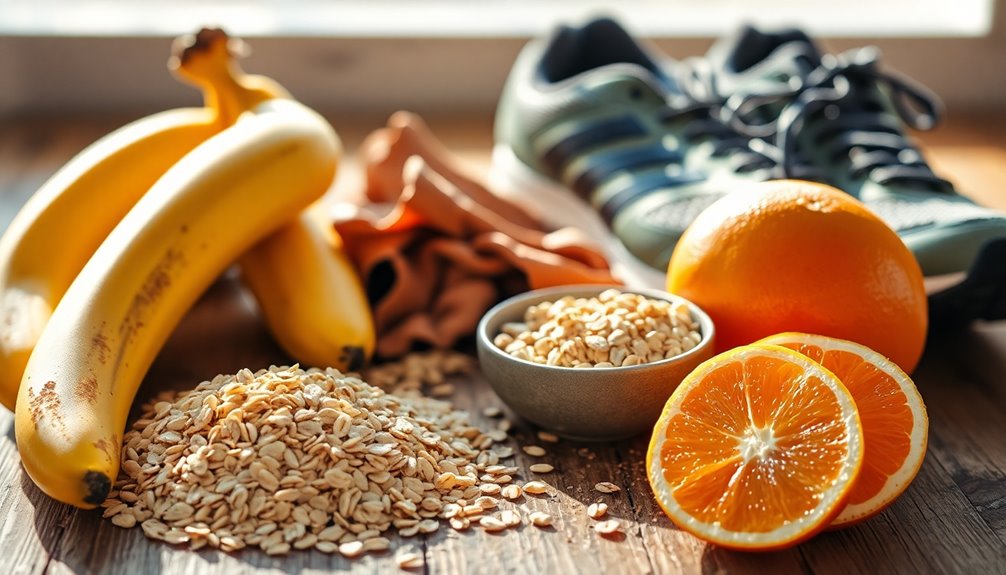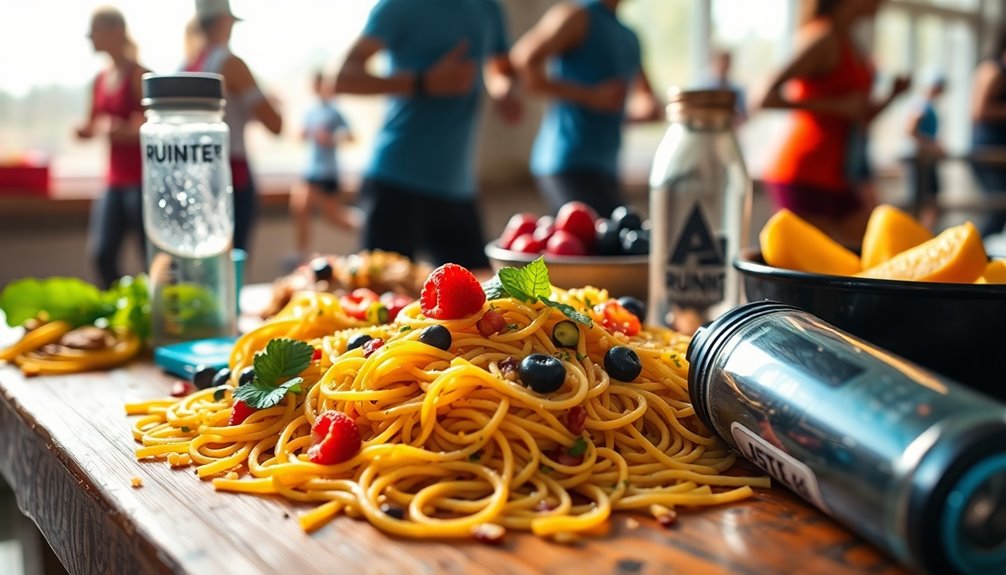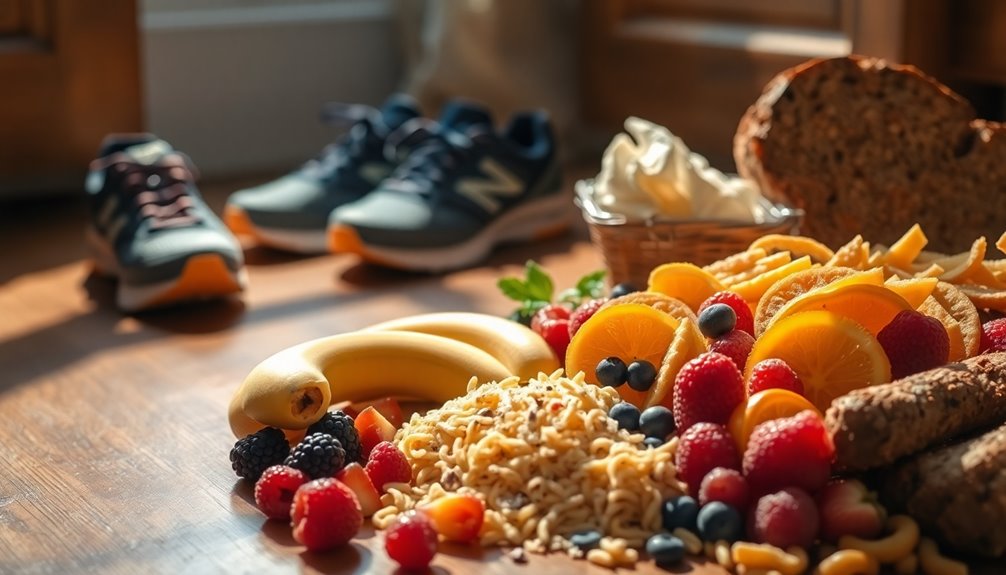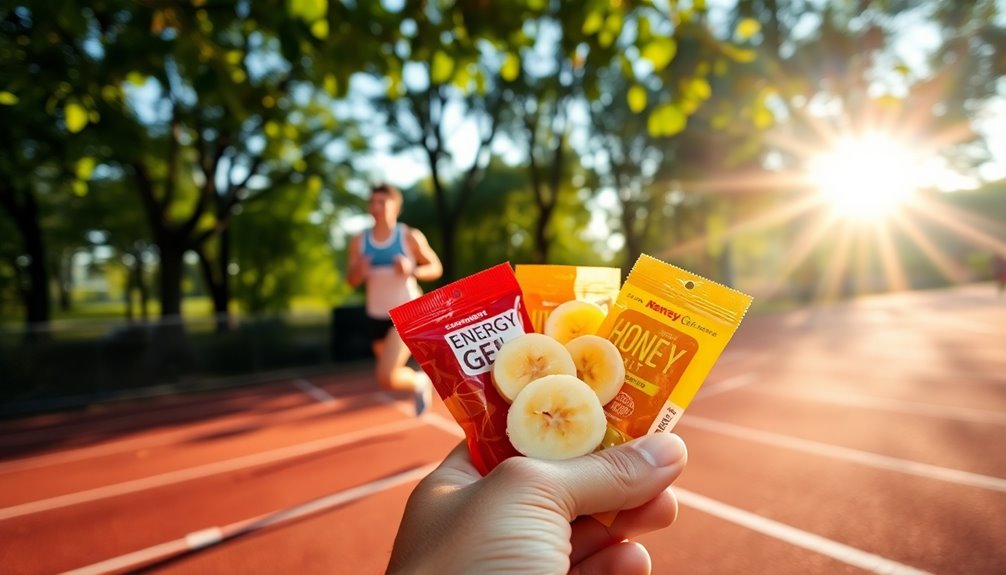Carbohydrates are your body's primary energy source, especially for endurance runs. They break down into glucose, fueling muscle contractions and preventing fatigue. To perform well, you should aim for 6-10 grams of carbs per kilogram of body weight, adjusting based on your training intensity. Consuming 30-60 grams of carbs during runs over 90 minutes will help maintain energy levels. There's so much more to learn about effective fueling strategies to enhance your performance!
Key Takeaways
- Carbohydrates are essential for providing energy during runs, especially complex carbs for sustained energy and recovery.
- Recommended carbohydrate intake for endurance activities ranges from 6 to 10 grams per kilogram of body weight.
- Fueling during long runs requires 30-60 grams of carbohydrates per hour to maintain energy levels and prevent fatigue.
- Pre-exercise, consume 1-4 grams of carbohydrates per kilogram 1 to 4 hours before running for optimal performance.
- Post-exercise recovery should include 1-1.2 grams of carbohydrates per kilogram within four hours to replenish glycogen stores effectively.

GU Energy Original Sports Nutrition Energy Gel, 8-Count, Vegan, Gluten-Free, Kosher, and Dairy-Free On-The-Go Energy for Any Workout, Raspberry Lemonade
The Original Sports Nutrition Energy Gel designed to help athletes perform their best; 100 calories and essential electrolytes…
As an affiliate, we earn on qualifying purchases.
As an affiliate, we earn on qualifying purchases.
What Are Carbohydrates?

Carbohydrates are essential for fueling your body, especially during physical activity. They're macronutrients made up of glucose molecules, serving as your primary energy source.
You can find carbohydrates in two main types: simple carbohydrates, which give quick energy bursts, and complex carbohydrates, which provide sustained energy.
For endurance runners, maintaining glycogen stores—your body's stored form of carbohydrates—is vital. When you run long distances, these stores help prevent fatigue and keep your performance steady.
Depleting glycogen can lead to "bonking," greatly impairing your ability to perform. To optimize your energy levels, the recommended carbohydrate intake for you ranges from 6 to 10 grams per kilogram of body weight, depending on your training intensity and duration. Additionally, consuming carbohydrates during your runs can help improve cognitive function and sustain your energy levels.

BARE PERFORMANCE NUTRITION Go Bar, Oat Based Endurance Training Snack 36g of Carbohydrates and 200 Calories Per Serving, 12 Bars Per Box, Original Oat
BPN GO BAR: A light, oat-based bar to fuel your body for endurance training. Each bar has 36g…
As an affiliate, we earn on qualifying purchases.
As an affiliate, we earn on qualifying purchases.
Carbohydrates and Endurance Performance

When you're engaging in endurance activities, carbohydrates become your body's go-to fuel source, as they efficiently break down into glucose to power muscle contractions.
To maintain ideal performance, it's essential to keep your muscle glycogen stores full. If you deplete these stores, you might experience fatigue, often referred to as "bonking."
During runs lasting over 90 minutes, aim to consume 30 to 60 grams of carbohydrates every hour to sustain energy levels. Remember, the rate of glycogen depletion varies with intensity and duration, so adjust your intake to your individual training needs.
After your workout, replenish glycogen by consuming 1 to 1.2 grams of carbohydrates per kilogram of body weight within the first four hours to aid recovery and reduce soreness.

(3 Pack) Sweet Relief Glycogen Support for Joints Blood Vessel Cleaner Releaf, Sweetrelief Glycogen Support Supplement Capsules, Glucogen O Neil Glyco Optimizer Cleanse Control Restore (180 Capsules)
As an affiliate, we earn on qualifying purchases.
As an affiliate, we earn on qualifying purchases.
Carbohydrate Recommendations for Endurance Runners

As an endurance runner, your carbohydrate intake is essential for peak performance.
You need to pay attention to daily guidelines, what to eat before your runs, and how to fuel during your workouts.
Let's break down these recommendations to guarantee you're always at your best.
Daily Carbohydrate Intake Guidelines
To fuel your performance effectively, endurance runners need to pay attention to their carbohydrate intake. Aim for the following daily guidelines based on your training intensity:
- Light Exercise: Consume 3-5 grams of carbohydrate per kilogram of body weight.
- Moderate Exercise: Increase to 5-7 grams of carbohydrate per kilogram.
- Intense Training: For sessions lasting 1-3 hours, target 6-10 grams of carbohydrate per kilogram.
In addition, remember to replenish carbohydrates every hour during long workouts. Aim for 30-60 grams of carbohydrates during exercise exceeding 90 minutes.
Incorporate complex carbohydrates into your meals to sustain energy and facilitate recovery.
Don't forget about post-exercise recovery, which should include 1 to 1.2 grams of carbohydrate per kilogram of body weight.
Pre-Exercise Carbohydrate Consumption
Maximizing your glycogen stores before a run can greatly enhance your performance. Consuming carbohydrates 1 to 4 hours before exercise is vital, with a recommendation of 1-4 grams of carbohydrates per kilogram of body weight.
For instance, if you weigh 150 pounds (68 kg), aim for about 68 grams of carbohydrates an hour before, 136 grams two hours prior, or 272 grams four hours ahead.
Choose easily digestible options like bananas, oatmeal, or white bread to avoid gastrointestinal issues. A high-carbohydrate meal 3-4 hours before running effectively prepares your body, ensuring you have the fuel needed for endurance. In addition to these easily digestible options, consider incorporating a small amount of protein, such as yogurt or a hard-boiled egg, to further enhance your energy levels. Staying hydrated is also crucial; drinking water before your run can help maintain optimal performance. Remember, if you’re unsure about what to eat before a run, sticking to familiar and light meals can help you avoid any unexpected discomfort on the route.
Establishing your personal carbohydrate strategy can notably influence your performance, so pay attention to timing and quantity.
During Exercise Fueling Needs
Proper fueling during exercise is vital for maintaining energy levels and optimizing performance, especially for endurance runners.
To guarantee you're getting the right carbohydrates, consider these guidelines:
- For runs lasting 30 to 75 minutes, consume less than 30 grams of simple carbohydrates.
- For endurance activities lasting 1 to 2 hours, aim for 30 grams per hour.
- For runs exceeding 2 hours, increase your intake to 60 grams per hour, and 90 grams for those over 3 hours.
Starting your fueling around 60 minutes into your run is essential to prevent fatigue.
Quick sources like energy gels and sports drinks can provide immediate energy, helping you stay fueled and focused throughout your workout.

GU Energy Original Sports Nutrition Energy Gel, 8-Count, Vegan, Gluten-Free, Kosher, and Dairy-Free On-The-Go Energy for Any Workout, Raspberry Lemonade
The Original Sports Nutrition Energy Gel designed to help athletes perform their best; 100 calories and essential electrolytes…
As an affiliate, we earn on qualifying purchases.
As an affiliate, we earn on qualifying purchases.
Carbohydrate Loading

When you're preparing for an endurance event, timing your carbohydrate loading is essential.
You should aim for a daily intake of 10 to 12 grams of carbohydrates per kilogram of body weight, focusing on easily digestible foods like white pasta and smoothies.
Timing for Loading
To enhance your endurance performance, timing your carbohydrate loading is essential. You'll want to maximize your glycogen stores in the days leading up to your event.
Here are three key tips to follow:
- Start 36 to 48 hours before your race to guarantee ideal glycogen storage.
- Choose high-carb foods like white rice, white pasta, and smoothies to boost energy availability while minimizing digestive issues.
- Taper your exercise intensity during this phase to help your body store more carbohydrates effectively.
Recommended Carbohydrate Intake
Carbohydrate loading requires careful planning and a specific intake strategy to maximize your performance potential.
To effectively boost your energy stores, aim for 10 to 12 grams of carbohydrates per kilogram of body weight each day for 36 to 48 hours before your event. Gradually increasing your carbohydrate intake helps your body adapt and optimize glycogen storage.
Focus on consuming carbohydrate-rich foods while minimizing fats and fiber to prevent gastrointestinal issues. Spread your carbohydrate intake throughout the day, incorporating snacks to reach your target.
This approach enhances your endurance, enabling you to delay fatigue during prolonged activities lasting longer than 90 minutes. By leveraging these strategies, you'll set yourself up for success on race day.
Foods for Carbohydrate Loading
Fueling your body with the right foods is essential for effective carbohydrate loading. To maximize your glycogen stores before an endurance event, focus on incorporating high-carbohydrate meals that include easily digestible carbohydrates.
Here are three excellent food options:
- White Rice – A great source, providing quick energy without added fiber.
- White Pasta – Perfect for loading up on carbs while remaining easy on the stomach.
- Smoothies – Blend fruits with low-fat yogurt for a tasty, high-carb snack.
As you increase your carbohydrate intake, remember to balance it with sources of protein.
Monitoring your daily consumption, aiming for 10 to 12 grams of carbohydrates per kilogram of body weight, will help guarantee you're properly fueled for peak performance.
Tips and Tricks to Meet Carbohydrate Recommendations

Meeting carbohydrate recommendations can feel overwhelming, but with a few strategic adjustments, you can easily incorporate them into your routine. Aim for 6-10 grams of carbohydrates per kilogram of body weight daily. Focus on timing: consume 1 gram per kilogram 1 hour before a run, or up to 4 grams if you eat 4 hours prior. During long runs, aim for 30-60 grams of carbohydrates per hour. Don't forget your recovery snack! Post-exercise, consume 1 to 1.2 grams per kilogram within 4 hours.
| Time Frame | Carbs per kg | Snack Ideas |
|---|---|---|
| 1 hour pre-run | 1 | Banana |
| 4 hours pre-run | 4 | Oatmeal |
| During long run | 30-60 grams | Energy gels |
| Post-exercise | 1-1.2 | Rice cakes |
| Daily intake | 6-10 | Whole grain bread |
The Science of Fuel

Energy is the lifeblood of physical performance, and understanding how your body utilizes carbohydrates is fundamental for optimizing it.
Carbohydrates provide glucose, the simplest form of energy, readily available in your bloodstream. During prolonged exercise, glycogen stored in your muscles and liver acts as a critical energy reserve.
However, when glycogen runs low, your body turns to fat and protein, which can hinder performance and delay muscle repair.
Here are three key points to remember:
- Glucose fuels immediate activity – essential for quick bursts of energy.
- Glycogen is important for endurance – it supports prolonged exercise.
- Balanced intake supports recovery – a mix of carbs, fats, and proteins enhances performance and muscle repair.
Eat To Support Good General Health

To maintain good general health, it's important to pay attention to your overall nutrient intake. Focus on incorporating simple carbohydrates for quick energy, but don't overlook the benefits of whole grains, which provide essential B vitamins and fiber.
Combine these with adequate protein and fat sources to support muscle recovery and hormone balance. Dairy products are essential too, supplying calcium and Vitamin D for strong bones.
Additionally, make certain you're getting enough iron from red meat, fortified grains, and beans to enhance oxygen transport in your blood—this is crucial for endurance during runs.
Prioritizing whole foods over restrictive diets guarantees you receive the necessary vitamins and minerals, supporting both your health and performance. Moreover, maintaining high vibrational energy during workouts can significantly improve your overall results and well-being, as noted in Law of Attraction in Sports and Fitness.
Frequently Asked Questions
How Many Carbs to Fuel a Run?
To fuel your run effectively, aim for a carbohydrate intake of 6-10 grams per kilogram of body weight for training sessions lasting 1-3 hours.
If you're running over 90 minutes, consume 30-60 grams of carbs every hour to maintain energy levels.
Pre-run, consider 1-4 grams of carbs per kilogram, depending on your timing.
After your run, focus on replenishing glycogen with 1-1.2 grams of carbs per kilogram for the first four hours.
Should I Eat More Carbs if I'm Running?
Think of your body as a car; it needs fuel to keep moving smoothly.
If you're running regularly, you should definitely eat more carbs. They're your primary energy source, helping you power through those miles without hitting a wall.
Aim for 6-10 grams of carbs per kilogram of your body weight, especially before and after your runs. This'll keep your energy levels high and your performance strong, ensuring you can go the distance.
What Is the Best Way to Refuel Carbohydrates During Exercise?
To refuel carbohydrates during exercise, you should start consuming 30 to 60 grams of simple carbs per hour, especially if your activity lasts over 90 minutes.
Energy gels, sports drinks, or candies work great because they're quick to absorb.
If you're running for 30 to 75 minutes, a smaller dose, under 30 grams, might suffice.
Don't forget to hydrate; it's just as important for maintaining your energy and performance levels.
Should I Carb Load for Long Runs?
If you're planning a long run lasting over 90 minutes, carb loading can definitely boost your performance.
You should focus on increasing your carbohydrate intake about 36 to 48 hours before your run. Aim for 10 to 12 grams of carbs per kilogram of your body weight daily during this period.
It's wise to experiment with different foods, like pasta or smoothies, to see what works best for you.
Don't forget to reduce your training intensity too!
Conclusion
Incorporating the right carbohydrates into your diet can be the secret sauce to elevating your running performance. By fueling your body properly, you'll not only enhance endurance but also support overall health. Remember, carbs are like the gas in your tank; without them, you won't go far. So, embrace the power of carbs, follow the recommendations, and watch how your runs transform. Your body will thank you as you cross each finish line with more energy and confidence!









